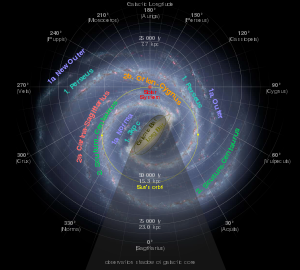Norma Arm
This article needs additional citations for verification. (December 2009) |

The Norma Arm is a minor spiral arm of the Milky Way extending from and around its central hub region.[1] The inner portion of the Arm is called the Norma Arm in narrow meaning. The outer end of it is identified either with the Cygnus Arm (not to be confused with local and minor Orion-Cygnus Arm), which lies outside the Perseus Arm, or the Outer Arm, which is located farther away from the center of the Galaxy than the Cygnus Arm.[1] The Norma Arm begins 2.2 kpc from the Galactic Center,[2] and extends outward to a radius of 15.5±2.8 kpc. It is named for the Norma constellation, through which the Arm as seen from Earth passes.
Like many other galaxies of similar type, the Milky Way consists of a large mass of stars shaped into the form of a relatively flat disc by gravity. The disc is rotating, with the dense central body of stars moving at greater speeds than those toward the rim of the disc. As a result, the pattern of stars within the Galaxy as viewed from directly above or below the disc has formed into a spiral.
Because of localised gravitational variations, the spiral pattern has itself formed several distinct 'spiral arms', where particularly large numbers of stars can be found.[1]
See also
[edit]References
[edit]- ^ a b c Churchwell, Ed; Babler, Brian L.; Meade, Marlin A. (2009). "The Spitzer/GLIMPSE Surveys: A New View of the Milky Way" (PDF). Publications of the Astronomical Society of the Pacific. 121 (877): 213–230. Bibcode:2009PASP..121..213C. doi:10.1086/597811. S2CID 15529740.
- ^ Vallée, Jacques P. (September 2017). "The Norma spiral arm: large-scale pitch angle". Astrophysics and Space Science. 362 (9): 5. arXiv:1708.07189. Bibcode:2017Ap&SS.362..173V. doi:10.1007/s10509-017-3145-5. S2CID 254256961. 173.

